The Strengthening Families Program is a research-based initiative designed to enhance family relationships and reduce risk factors for youth aged 7-17․ It combines role-playing, discussions, and interactive activities to foster communication and pro-social skills, promoting a supportive family environment․
Overview and Objectives
The Strengthening Families Program is a research-based initiative designed to enhance family relationships and reduce risk factors for youth aged 7-17․ It focuses on improving communication, emotional regulation, and problem-solving skills through interactive activities․ The program aims to foster resilience, promote pro-social behavior, and strengthen family bonds․ Objectives include empowering parents to guide their children effectively and creating a supportive environment for youth to thrive․ Activities are structured to be engaging and inclusive, ensuring long-term positive outcomes․
The program enhances family communication through role-playing, discussions, and interactive games, fostering trust and understanding among parents and children․
The program employs role-playing to practice real-life scenarios, helping families navigate conflicts and improve interactions․ Guided discussions encourage open dialogue, fostering emotional understanding and strengthening bonds․ These activities are structured to be engaging and effective, ensuring families develop healthier communication patterns․ The program incorporates interactive learning games and collaborative family projects to promote bonding and skill development․ These activities are designed to be fun and engaging, helping families work together to solve problems and build positive relationships․ Through these exercises, participants develop teamwork, communication, and problem-solving skills, fostering a supportive and connected family environment․ The program empowers individuals to develop essential life skills, fostering empathy, cooperation, and responsibility․ These skills promote positive behavior and contribute to a supportive family and society․ The program involves evaluating personal strengths, skills, and positive traits to foster resilience․ Activities like the “About Me” worksheet help children reflect on their accomplishments and self-perception․ Families identify areas for growth, aligning activities with individual needs to enhance confidence and social competence․ This assessment guides the development of tailored strategies, ensuring a focused approach to skill-building and personal development․ The program emphasizes fostering healthy friendships through role-playing exercises, helping children practice social interactions and conflict resolution․ Activities like discussing “What Makes a Good Friend” and enacting scenarios teach empathy and cooperation․ Parents also learn to support their children in forming positive relationships, while sharing “No A․T․O․D․” rules to guide their interactions, ensuring a safe and supportive environment for social growth․ The program fosters collaboration between parents and communities through shared activities and discussions, ensuring alignment on rules and expectations to support children’s positive development and safety․ Engaging with children’s friends and their parents is crucial for building trust and ensuring a supportive environment․ By sharing no-A․T․O․D․ rules and planning fun activities together, families create a network that helps kids stay out of trouble․ This collaborative approach fosters open communication and mutual understanding, reinforcing positive behaviors and shared values among all participants․ Sharing rules and planning activities fosters a supportive environment for children․ Parents and kids collaborate to establish clear, fair guidelines, such as no-A․T․O․D․ rules, ensuring everyone understands expectations․ This process encourages open communication and mutual respect․ By planning fun, engaging activities together, families create opportunities for bonding and positive behavior, helping kids stay on track while fostering a sense of responsibility and teamwork․ The program teaches parents healthy coping skills and stress management techniques, enabling them to maintain resilience and function effectively despite challenges and adversity․ The program equips parents with healthy coping skills to manage stress and adversity․ Techniques include deep breathing, mindfulness, and positive self-talk to enhance emotional resilience․ These strategies help parents maintain stability and model healthy behaviors for their children, fostering a supportive family environment․ Interactive activities and discussions further reinforce these coping methods, ensuring parents can navigate challenges effectively while promoting overall family well-being․ The program emphasizes setting clear expectations and consistently enforcing family rules to guide children’s behavior․ Parents learn to monitor activities effectively and communicate openly with their kids․ Role-playing exercises help model positive interactions, while collaborative discussions with other parents foster shared strategies for maintaining a safe and supportive environment․ These practices strengthen parental oversight and ensure ongoing support for children’s social and emotional development․ Engaging exercises, games, and workshops foster meaningful connections between parents and children; These activities encourage open communication, teamwork, and mutual understanding, strengthening family bonds and trust․ Interactive exercises and games are designed to enhance parent-child communication and problem-solving skills․ Workshops provide hands-on experiences, fostering collaboration and trust․ These activities create a fun, engaging environment for families to learn and grow together, strengthening their relationships and building resilience․ Family meals and interactive sessions are core components of the program, fostering connection and communication․ These sessions include shared meals and activities that encourage bonding, teamwork, and mutual understanding․ They provide a platform for families to engage in meaningful conversations and collaborative problem-solving, strengthening their relationships and creating lasting memories․ Role-playing and interactive exercises are essential for practicing communication and problem-solving skills in a supportive environment, fostering healthier family dynamics and stronger relationships․ Skills practice and learning games are engaging activities designed to help families build communication and problem-solving abilities․ These exercises foster teamwork, creativity, and mutual understanding through fun, interactive challenges․ By incorporating real-life scenarios, families learn to apply positive behaviors and strategies effectively․ The games are structured to promote bonding while reinforcing key skills, creating a supportive environment for growth and connection; Video and lecture integration enhances learning by combining visual and auditory elements to address key topics like communication and problem-solving․ Short lectures provide foundational knowledge, while videos demonstrate real-life applications, making concepts relatable․ This blend of formats caters to different learning styles, ensuring participants engage effectively and retain information․ The content is designed to be accessible and impactful, fostering a deeper understanding of family dynamics․ Setting family goals involves collaborative discussions to identify values and aspirations, creating positive traditions, and using provided resources like worksheets to guide the process effectively․ Creating positive family traditions fosters bonding and resilience․ Activities like shared meals, games, and cultural celebrations help establish meaningful routines․ Families can use provided worksheets to brainstorm ideas and plan traditions that promote unity and joy․ These customs, rooted in shared values, strengthen relationships and create lasting memories, encouraging a supportive and loving home environment for all members․ Planning and monitoring progress helps families stay on track with their goals․ The program provides tools like PDF worksheets and action plans to set clear objectives․ Regular check-ins and reflections allow families to assess their achievements and adjust strategies․ This structured approach ensures consistent growth, helping families maintain focus and celebrate milestones in their journey toward stronger relationships and resilience․ The program emphasizes inclusivity, respecting diverse cultural backgrounds and family values․ Activities are tailored to address unique needs, ensuring all participants feel valued and supported equally․ The program tailors activities to meet the unique needs of diverse families, ensuring cultural sensitivity and inclusivity․ It supports families with varying structures, backgrounds, and challenges, fostering an environment where all participants feel valued․ Activities are adaptable to accommodate different learning styles, languages, and cultural practices, ensuring everyone can benefit equally from the program’s resources and tools․ The program emphasizes partnerships with local organizations to provide comprehensive support for families․ By collaborating with schools, churches, and community centers, it ensures access to resources, workshops, and events․ This collective effort fosters a network of support, empowering families to thrive through shared goals and mutual assistance, ultimately strengthening the community as a whole․ The program provides accessible resources, including PDF downloads of worksheets, handouts, and an implementation guide, ensuring families and facilitators have necessary tools for successful participation․ The program offers downloadable PDF resources, including activity worksheets, family goal templates, and skill-building exercises․ These tools are designed to enhance participation and provide structured guidance for families․ Worksheets like the “About Me” activity help children reflect on their strengths and goals, fostering self-awareness and positive development․ Accessible online, these materials support consistent engagement and skill practice beyond program sessions․ The program provides a comprehensive implementation guide and toolkit, offering step-by-step instructions for facilitators․ It includes session plans, activity descriptions, and evaluation tools to ensure effective delivery․ The toolkit supports consistent program execution, helping facilitators engage families and promote positive outcomes․ Resources are adaptable to various settings, ensuring flexibility and accessibility for diverse community needs and preferences․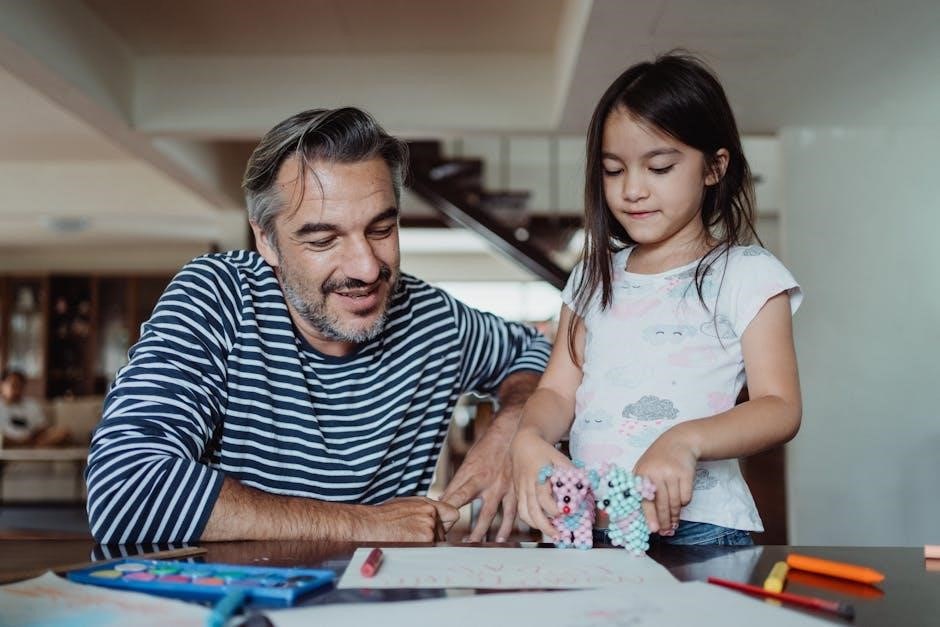
Building Communication Skills
Role-Playing and Discussions
Learning Games and Family Projects

Pro-Social Skills Development
Assessing Strengths and Skills
Friendship Skills and Role-Playing
Community and Parental Involvement
Getting to Know Kids’ Friends and Parents
Sharing Rules and Planning Activities
Parental Resilience and Stress Management
Healthy Coping Skills
Monitoring and Support
Parent-Child Interactive Activities
Exercises, Games, and Workshops
Family Meals and Interactive Sessions
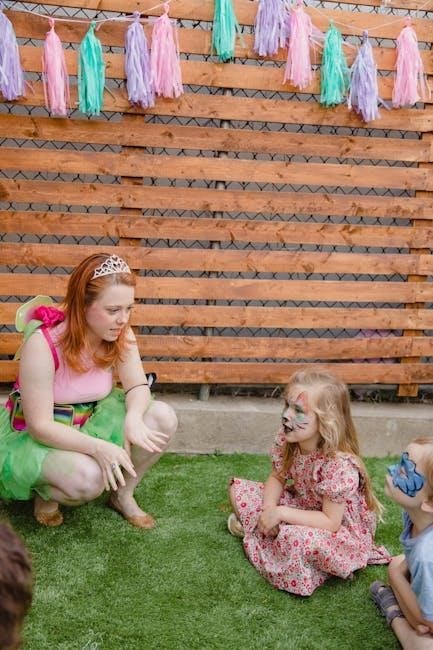
Role of Role-Playing and Interactive Exercises
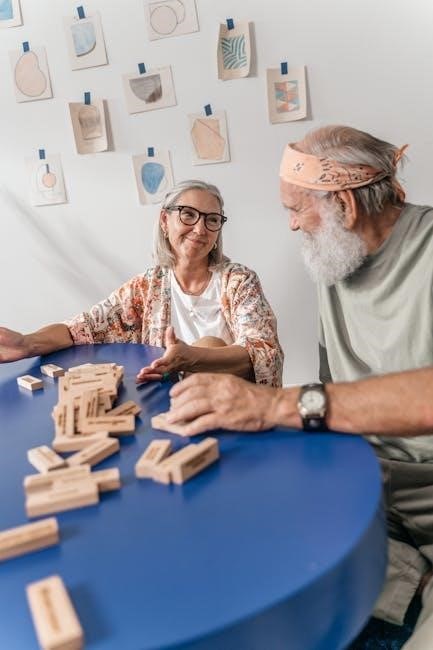
Skills Practice and Learning Games
Video and Lecture Integration
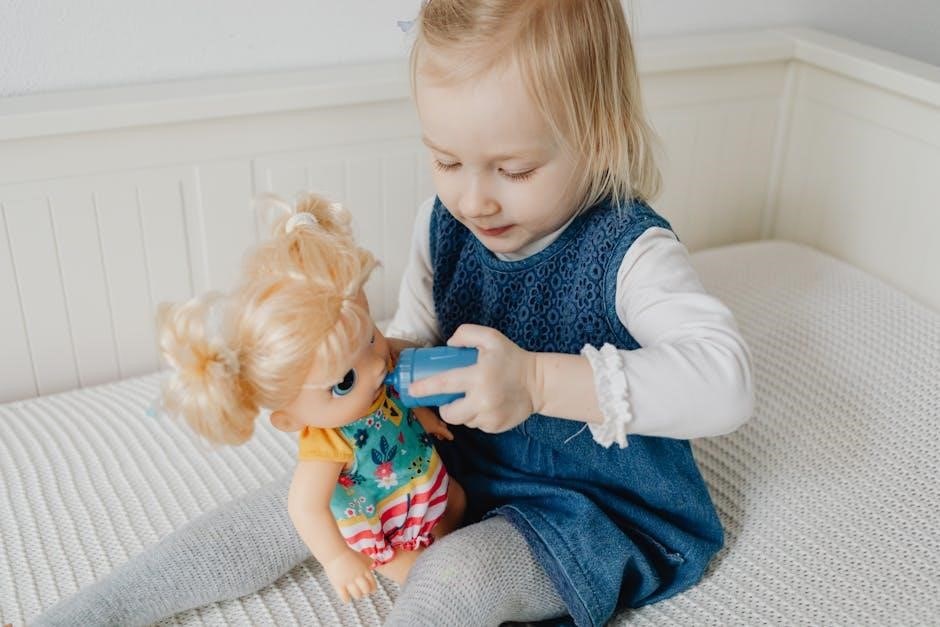
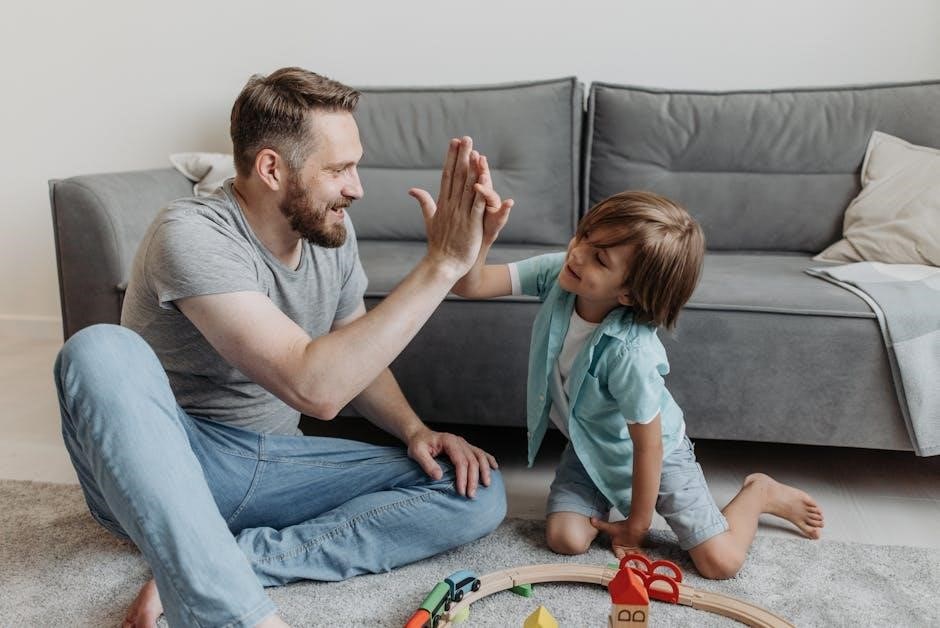
Setting Family Goals
Creating Positive Family Traditions
Planning and Monitoring Progress
Cultural Sensitivity in Program Activities
Addressing Diverse Family Needs
Community Collaboration and Support
Accessing Resources and Materials
PDF Downloads and Worksheets
Implementation Guide and Toolkit